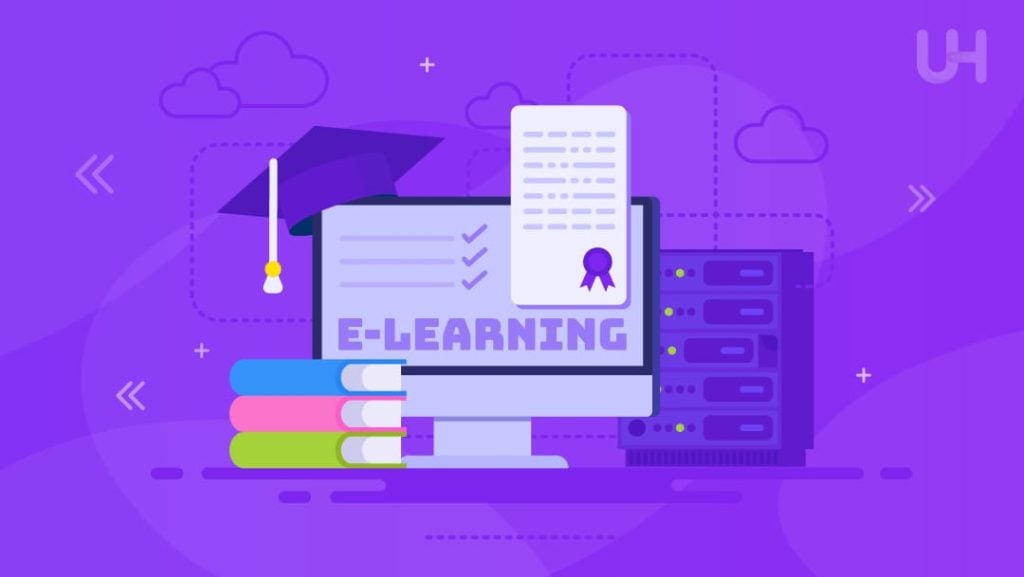
E-learning platforms have emerged as the catalysts for a digital revolution. These platforms empower educators, institutions, and organizations to transcend geographical boundaries, making knowledge accessible to learners worldwide. However, behind every successful e-learning venture lies a crucial foundation: Web Hosting. The hosting solution you choose for your e-learning platform can either propel it to new heights or pose significant challenges.
In this comprehensive guide, we will explore the intricate world of web hosting for e-learning platforms. From understanding the types of hosting available to uncovering the key factors and best practices, we will talk about all you need to know to make informed decisions in your quest to deliver effective, secure, and scalable online education. So buckle up, whether you’re an experienced educator or a visionary entrepreneur, as we go through the virtual world of e-learning hosting.
Understanding E-Learning Platforms
E-learning platforms have progressed greatly over time and have become an essential component of modern education and professional development. Understanding these platforms, their complexities, and their applications is critical for anybody interested in online learning or using them for educational or corporate objectives. Let’s have a look at what e-learning platforms are and how they work. Additionally, software development for e-learning plays a pivotal role in shaping these platforms and enhancing their functionality to provide effective online learning experiences.
What Are E-Learning Platforms?
E-learning platforms, often known as Learning Management Systems (LMS) or Online Learning Platforms, are digital environments designed to create, deliver, manage, and track educational content more easily. They function as virtual classrooms, training centers, and knowledge archives that are available via the Internet. Because of its flexibility, accessibility, and scalability, e-learning systems have grown in popularity.
Applications of E-Learning Platforms
E-learning platforms have a wide range of applications across different sectors:
- Academic Learning: Traditional educational institutions, such as schools and universities, use e-learning platforms to supplement in-person classes or offer fully online degree programs.
- Corporate Training: Companies deploy e-learning platforms to upskill employees, disseminate compliance training, and foster professional development.
- Professional Development: Individuals turn to e-learning platforms to acquire new skills, pursue certifications, and stay current in their industries.
Inherent to e-learning top platforms like Podia is the need for scalability. These platforms often experience fluctuating user loads, especially during peak enrollment periods. Therefore, a reliable and efficient web hosting infrastructure is crucial to support the scalability requirements of e-learning websites.
Types of Web Hosting for E-Learning
Web hosting is an important component of e-learning platforms since it has a direct impact on their performance, dependability, and scalability. When selecting web hosting for an e-learning website, it is critical to evaluate the platform’s specific requirements and goals. There are various types of web hosting accessible, each with its own set of benefits and drawbacks. Let’s explore the most common types of web hosting for e-learning platforms:
Shared Hosting
Shared hosting is analogous to living in an apartment with roommates. Multiple websites share server resources such as CPU, RAM, and disk space. It’s a cost-effective solution for tiny e-learning sites with low traffic.
Advantages
- Cost-effective: One of the most cost-effective hosting solutions is shared hosting.
- Easy setup: Server management is handled by hosting providers, making it user-friendly for beginners.
- Appropriate for basic e-learning websites with modest resource requirements.
Limitations
- Limited resources: Sharing resources with other websites can cause performance concerns during traffic surges.
- Less control: Access to server configurations and software customization is restricted.
- Large e-learning platforms with significant user loads are not recommended.
Virtual Private Server (VPS) Hosting:
VPS hosting is a dedicated virtual environment that exists within the limits of a shared server. Each virtual private server is self-contained, with its own set of resources and settings. It’s an excellent option for medium-sized e-learning sites.
Advantages
- Increased control: With shared hosting, there are more customization choices.
- Scalability: Because resources may be modified as needed, it is appropriate for increasing platforms.
- Improved performance and dependability over shared hosting.
Limitations
- Resource limitations: While VPS hosting provides greater resources than shared hosting, it may still have constraints during periods of high demand.
- Management and configuration necessitate some technical knowledge.
Dedicated Hosting
Dedicated hosting allocates a full physical server to your e-learning platform. It provides the most control, performance, and security. This is a good solution for large-scale e-learning platforms.
Advantages
- Full control: Total command of server configurations, software, and resources.
- High performance: Because dedicated servers provide consistent performance, they are perfect for resource-intensive e-learning platforms.
- Improved security and separation from other websites.
Limitations
- Cost: Dedicated hosting is often more expensive than shared and virtual private server hosting.
- Server management and maintenance necessitate technical skills.
Cloud Hosting
Cloud hosting makes use of an interconnected network of virtual servers to provide scalability and redundancy. It’s appropriate for e-learning platforms of various sizes because resources can be scaled up and down as needed.
Advantages
- Scalability: Scalability refers to the ability of resources to be immediately scaled in response to fluctuations in user traffic.
- Redundancy: Data is dispersed among numerous servers to reduce the possibility of an outage.
- Pay-as-you-go pricing: You only pay for the resources you utilize, which saves money.
Limitations
- If resource utilization is not carefully controlled, pricing can become unpredictable.
- Control is limited in comparison to dedicated hosting, while some cloud providers give substantial customization options.
Each sort of web hosting has its own set of trade-offs, and the optimal option for your e-learning platform is determined by considerations such as the size of your platform, expected growth, budget, and technical ability. To ensure a flawless and reliable e-learning experience for your users, carefully examine your requirements and select the hosting option that matches your specific demands.
How to Choose the Right Web Hosting for E-Learning?
Choosing the right web hosting provider for your e-learning platform is a key decision that can have a big impact on the success of your online education activities. Consider the following crucial elements to make an informed decision:
1 – Performance and Reliability
- Examine the uptime guarantee provided by the hosting company. To avoid delays in access to your e-learning platform, look for providers with 99.9% uptime or greater.
- Check the server performance and responsiveness of the hosting company. Slow load times can irritate consumers and make learning more difficult.
- Use Content Delivery Networks (CDNs) to cache and distribute content from servers closer to your users. This can minimize server load and improve page load times.
2 – Scalability and Resources
- Examine the allotted CPU, RAM, and bandwidth resources to ensure they can handle peak loads without performance deterioration. To support changes in user traffic during course enrollments or events, scalability is critical. Partnering with expert elearning software development providers can further enhance the platform by integrating custom features, ensuring a seamless and engaging learning experience for users.
- Inquire about load balancing, which is a system that distributes traffic across multiple servers to prevent overloads at peak times.
- Talk to your hosting provider about how they handle abrupt traffic increases. Ensure that they have measures in place to handle spikes in user activity without sacrificing performance.
3 – Security and Data Protection
- Ensure that your hosting provider provides SSL certificates to secure data transmission between users and your e-learning platform, hence improving data security.
- Protect against unauthorized access, DDoS assaults, and other cyber risks by implementing strong firewalls and other security measures.
- Back up your e-learning platform’s data on a regular basis to protect against data loss caused by unanticipated incidents, hardware failures, or security breaches.
- Check that your hosting solution conforms with appropriate data protection and privacy requirements, such as GDPR or HIPAA, if your e-learning platform requires it.
4 – Support and Customer Service
- Look for hosting companies that give responsive customer service. Technical issues might emerge, and having a support team on hand to address these issues as soon as possible is critical.
- Consider hosting companies that provide 24-hour customer assistance, especially if your e-learning platform serves consumers in several time zones.
- Examine the technical knowledge available for server maintenance, troubleshooting, and optimization. Server-related activities can be handled by hosting companies with experienced staff.
5 – Cost Considerations
- While price is important, prioritize the long-term value of your hosting solution over short-term cost savings. A hosting solution that fulfills the needs of your platform and is scalable may deliver better value in the long term.
- Understand the pricing structure of the hosting provider. Some cloud hosting services offer pay-as-you-go pricing, while others may have fixed monthly or annual prices.
- Plan your hosting budget carefully, taking into account both upfront and recurring expenditures. As your e-learning platform grows, be prepared to allocate resources for hosting.
6 – Long-Term Growth and Goals
- Consider the expansion potential of your e-learning platform. Choose a hosting provider that will grow with your platform as it gains more users and courses.
- Plan for future requirements and technology. Ascertain that your hosting selection is consistent with your long-term goals and technical improvements in online education.
When selecting web hosting for your e-learning platform, you may make an informed decision by thoroughly examining five crucial elements. Prioritize the criteria that are most closely aligned with the unique needs of your platform to ensure a dependable and efficient hosting solution that promotes a seamless learning experience for your users.
Your One-Stop Solution For Web Hosting
Ready to take the next step in launching your e-learning platform or upgrading your current hosting solution? Don’t let your educational vision wait any longer. Choose a reliable and secure web hosting partner. Ultahost is here to support your journey with tailored hosting options.
Case Studies: E-Learning Platforms and Their Hosting Solutions
To better understand the practical implications of hosting choices, let’s explore a few real-world case studies:
EdTech University: EdTech University is a large online university that offers degree programs in a variety of fields. They chose dedicated hosting to provide continuous performance and stability for their large student population. They effectively manage peak enrollments and provide uninterrupted access to course materials since they have complete control over server resources.
Corporate Training Solutions: A multinational firm that provides training to employees all over the world chooses cloud hosting for its e-learning platform. This move enabled them to increase resources on-demand, guaranteeing that thousands of employees, regardless of location, could access training modules without delay.
These case studies demonstrate how hosting options correspond with the unique needs and scalability of e-learning platforms, underlining the need for a customized hosting solution.
Best Practices for Choosing E-Learning Web Hosting
In summary, here are some best practices to guide you in choosing the right web hosting for your e-learning platform:
- To provide a smooth learning experience, prioritize performance, dependability, and uptime.
- Examine scalability to account for fluctuations in user traffic and enrollment periods.
- Prioritize security steps to protect sensitive user data.
- Seek out responsive customer service and technical competence for troubleshooting and upkeep.
- Long-term value should be prioritized over short-term cost savings.
- Match your hosting option to the size and growth potential of your e-learning platform.
Future Trends in Web Hosting for E-Learning
1 – Predictions for E-Learning Growth
As technology continues to advance and the demand for online education grows, several key predictions for the future of E-Learning growth can be made:
- Explosive Global Adoption: It is projected that e-learning will continue to expand globally, reaching new regions and demographics. As internet connection becomes more accessible, emerging markets will witness significant growth.
- Mobile Learning Dominance: As smartphones and tablets become more popular, E-Learning platforms will need to optimize for mobile learning experiences. Responsive design and mobile-first design will become the norm.
- Personalization and AI: To tailor learning routes for individual students, e-learning platforms will increasingly rely on AI and machine learning. This will improve engagement and learning outcomes.
- Immersive Technologies: Virtual reality (VR) and augmented reality (AR) will become essential components of E-Learning, enabling immersive experiences that are particularly useful for hands-on courses and skill training.
- Lifelong Learning: The concept of lifelong learning will grow in popularity. Adults seeking possibilities for upskilling or reskilling will drive an increase in demand for E-Learning.
2 – Evolving Hosting Technologies
Web hosting for E-Learning platforms will evolve in tandem with technological advancements to meet the growing demands of learners and educators. Here are some hosting technology trends:
- Serverless Computing: Serverless hosting models will gain popularity since they enable autonomous scaling, cost-efficiency, and reduced maintenance overhead.
- Edge Computing: By lowering latency, edge hosting will improve content delivery. This will be especially useful in E-Learning for real-time interactions and video streaming.
- Blockchain for Credentialing: Blockchain technology will be used to validate and secure digital credentials and certifications, hence increasing the reliability of E-Learning platforms.
- Green Hosting: Green hosting will prioritize environmental sustainability. Hosting providers will use renewable energy sources more frequently and optimize data centers for energy efficiency.
- Quantum Computing: While still in its early stages, quantum computing has the potential to transform hosting by providing unmatched processing capacity for complicated simulations and data analysis.
Conclusion
Web hosting is crucial in influencing the learning experience in the ever-changing world of online education. To address the needs of students, professionals, and organizations seeking information and skill development, e-learning platforms must provide performance, dependability, scalability, and security.
Understanding the various forms of web hosting, critical considerations to consider, real-world case studies, and best practices will enable you to make informed decisions that will ensure the success and dependability of your e-learning activities. As the digital sphere of education expands, your choice of web hosting can make or break your ability to provide quality education to learners all over the world.
Now, it’s time to take action and choose the right web hosting solution for your e-learning platform. Ultahost is a trusted provider known for its reliable and secure hosting services. We offer a range of hosting options, including shared hosting, VPS hosting, dedicated hosting, and cloud hosting, all tailored to meet the specific needs of e-learning platforms. Remember, the future of education is online, and the right hosting partner can make all the difference. Choose Ultahost and embark on your e-learning journey with confidence.
FAQ’s
Hosting your own e-learning platform necessitates technological know-how and resources. To assure stability and assistance, many businesses choose hosting providers that specialize in e-learning hosting.
For small education websites with low traffic, shared hosting can be a cost-effective option. It provides critical hosting services while remaining cost-effective. Consider the possibility of scalability as your website grows.
Hosting an e-learning platform involves several essential steps:
- Select the type of hosting that best meets the needs of your platform, such as shared hosting, Virtual Private Server (VPS) hosting, dedicated hosting, or cloud hosting.
- Research and select a reliable hosting provider that offers the hosting type you’ve chosen.
- Configure your e-learning platform by installing and setting up the necessary software, such as a Learning Management System (LMS).
- Begin uploading your educational content, including text materials, videos, quizzes, assignments, and multimedia elements.
- Implement security measures, such as SSL/TLS encryption, firewalls, and regular data backups, to protect user data and maintain the integrity of your platform.
- Optimize the performance of your platform by ensuring that it loads quickly and efficiently.
- Regularly update and maintain your platform to keep it secure and functional.
E-learning platforms host a variety of content, including course materials (text, videos, quizzes), user data (profiles, progress), administrative resources (curriculum plans), and multimedia elements (simulations).









